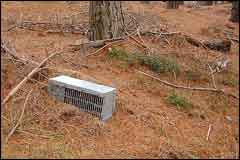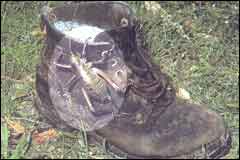|
|
|||
|
||||
|
Updated: September 12, 2001 |
|
|
|||||||||||||||||||||||||||||||||||||||||||||||||||||||||||||||||||||||||||||||
 Live cat traps are set on the sand dunes around Whangapoua Beach on Great Barrier Island |
|
 Cats hunt at night often killing weta and moths |
Cats are a major predator on Great Barrier Island. They threaten bird life both chicks and adults and also eat lizards. Cats like to hunt at night and often eat nocturnal feeding insects like weta.
Cats may have been the reason for the rapid decline in kokako numbers on Great Barrier. In 1993, the last two kokako on Great Barrier Island were transferred to Little Barrier Island for safety.
A national Department of Conservation education campaign - Your Pet is a Predator - is designed to raise awareness of the problems cats can cause. DoC is working with local councils to reduce the number of cats brought to the island. They promote sterilisation for cats already on the island to control their breeding potential. They also trap and destroy feral cats.
Some ways to help native species if you are a cat owner
Find
out more about introduced predators including feral cats at
the DoC web site: http://www.doc.govt.nz/cons/pests/predators.htm.
(Note: Clicking on the link opens a new window in your
browser).